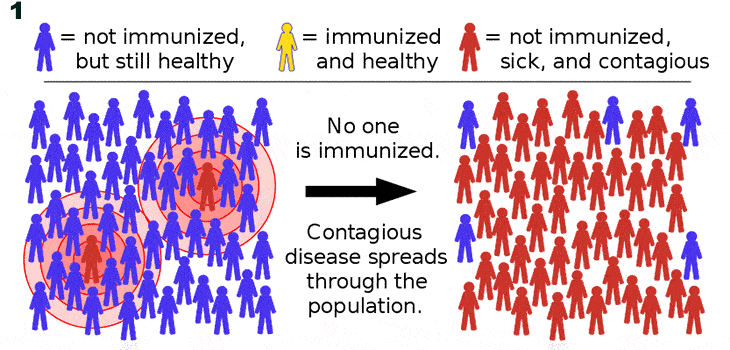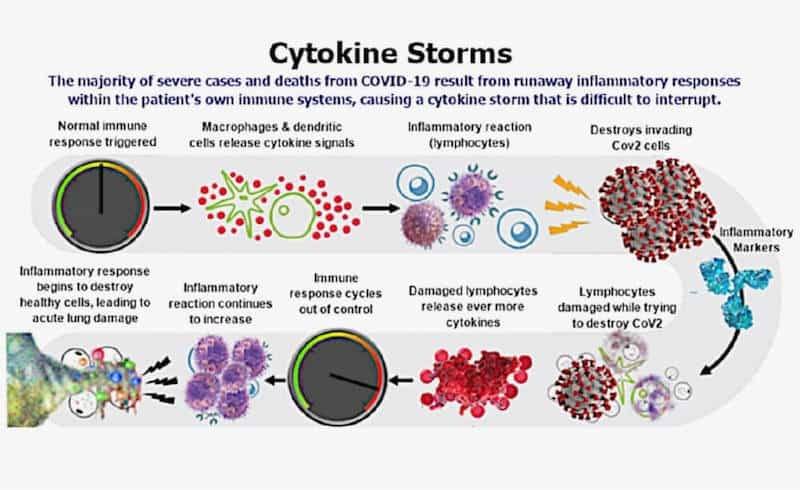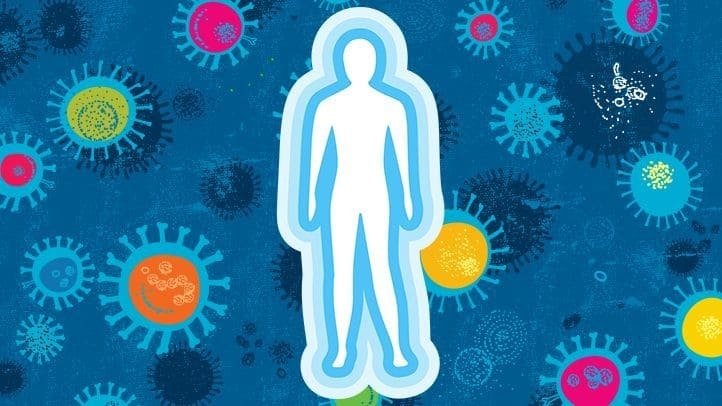Forget Herd Immunity — Make Your Immune System Smart!
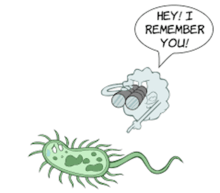
Everyone’s hoping that herd immunity is going to help us resist Covid-19 infection, but your better bet is to start working on making your immune system smart, because a strong immune system will only help in the beginning.
Check out my Covid Immunity Course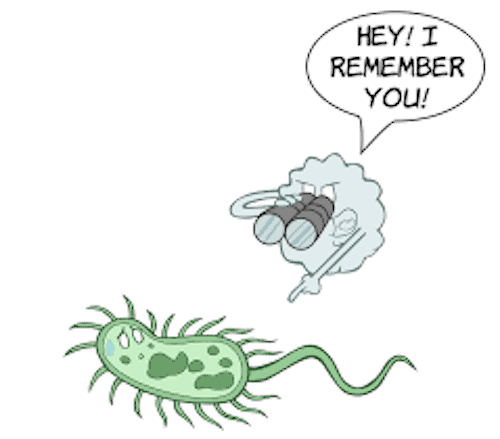 Herd immunity is supposed to somehow miraculously protect us as we soon will emerge from our isolated lives and rejoin society, but what’s more likely is that the challenge to remain uninfected from Covid-19 will be more daunting than it ever was.
Herd immunity is supposed to somehow miraculously protect us as we soon will emerge from our isolated lives and rejoin society, but what’s more likely is that the challenge to remain uninfected from Covid-19 will be more daunting than it ever was.
This reemergence is happening in various places worldwide. In the U.S. the majority of states have either given their residents the green light or have plans to do so. This is happening before the Covid-19 infections curve has flattened.
Most States Still Show A Steady Increase of Covid-19 Infections
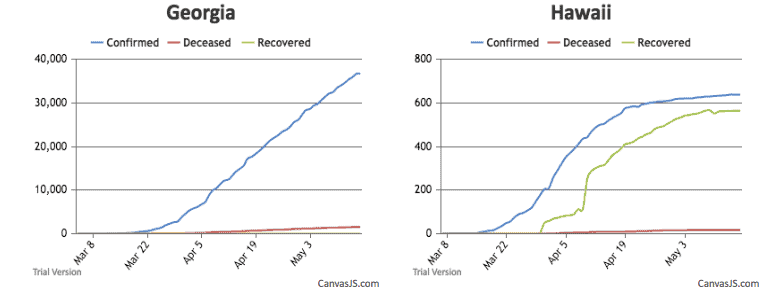 (Look for your state here.)
(Look for your state here.)
As I reported in last week’s post, when the infection data for New York city is excluded, the rest of the U.S. is still experiencing an upward trend in Covid-19 infections. This is made clear when you look at state-by-state data, as of May 14, 2020:
| States maintaining a steady or increased rate of Covid-19 infections: | Alabama, Arizona, Arkansas, California, Colorado, Connecticut, Delaware, District of Columbia, Florida, Illinois, Indiana, Iowa, Kansas, Kentucky, Maine, Maryland, Massachusetts, Michigan, Minnesota, Mississippi, Missouri, Nebraska, Nevada, New Hampshire, New Mexico, North Carolina, North Dakota, Ohio, Oklahoma, Oregon, Pennsylvania, Rhode Island, South Carolina, South Dakota, Tennessee, Texas, Utah, Virginia, Washington, West Virginia, Wisconsin, Wyoming |
| States with rising infections but at a slower rate: | Idaho, New Jersey, New York |
| States close to leveling off: | Alaska, Hawaii, Louisiana, Montana, Vermont |
| States with declining infections: | Nowheresville |
Thus, unless things change pretty dramatically very soon, we will all be released back into society well before the incidence of Covid-19 infections have abated in most states. And it’s unlikely that the fabled “Herd Immunity” will protect you.
The Deal With Herd Immunity
(Stay with this image for a moment as it cycles thru three images.)
As reported by Denise Chow at NBC News, there are two main ways to achieve high levels of herd immunity in a population:
- From people who have already been infected and their immune systems have developed antibodies to protect against future infections (at least for the short term), or
- A substantial portion of the population is vaccinated.
For Covid-19, it’s estimated that 50 to 70% of the population will need to be immune to achieve herd immunity. There have been more than 4.3 million confirmed coronavirus cases worldwide, and yet no country has approached the levels of immunity needed to slow transmissions.
In Wuhan, China, for instance, thousands of people returned to work in April. They were tested for antibodies. Only 2 to 3% had developed them. Early results from a nationwide study in Spain found that about 5% of the roughly 90,000 people tested were positive for antibodies. In New York City, a place with high infection rates, the data was better, but underwhelming: of 1,300 people tested, 21% were positive for antibodies.
Dr. Robert Atmar, an infectious disease specialist at Baylor College of Medicine in Houston, puts the New York City antibody data in perspective:
That means 80 percent of the population would appear to still be susceptible. So even in an area that has been highly affected, we’re not seeing the levels that you would expect for herd immunity.
We Need A Smarter Immune System
Given that:
(a) The vast majority of us do not know if we even got the Covid-19 infection and remained asymptomatic or had such mild symptoms that we couldn’t be sure if the source was Covid;
(b) We don’t have access to testing or inoculation;
(c) We’re about to be more exposed to the virus as we re-enter the world; then
(d) we must take active steps to make our immune system SMARTER.
Yes, smarter, not necessarily stronger. The difference is of monumental importance, for one of the reasons people get very sick and die from Covid-19 is that their immune response remains too strong after the first phase of the infection, causing excessive and unrelenting inflammation — the so-called “cytokine storm” — which leads to ventilators, and death.
The phrase, “cytokine storm” is a layman’s term for a cytokine cascade or hypercytokinemia. A cytokine storm develops in the body due to an excessive positive feedback loop between cytokines and immune cells, which causes an excessive level of cytokines in the body, resulting in an overwhelming amount of inflammation that can kill you.
James Hamblin of The Atlantic wrote an insightful piece about the variability of symptoms experienced by people infected with Covid-19, and he explained what is a cytokine storm and why it’s so devastating.
A cytokine is a short-lived signaling molecule that the body can release to activate inflammation in an attempt to contain and eradicate a virus. In a cytokine storm, the immune system floods the body with much more of these molecules than is necessary; so much more, in fact, that the level of excess inflammation becomes life threatening.
When this happens, a strong immune system response has become the villain, and the priority for doctors shifts from wanting a person’s immune system to fight off the virus to working to downregulate the immune response so it doesn’t kill the person or cause permanent organ damage. The challenge is striking a balance where neither the cytokine storm nor the infection runs rampant.
And that’s why I said at the outset, that as we reenter the world, we need to make our immune system smarter, not necessarily stronger.
How can this be done, you ask?
The Covid Immunity Course
UPDATE: The Covid Immunity Course is live! The first two lessons are FREE.
There’s no short answer or quick bromide to become Covid Bulletproof; it largely depends on whether you have certain comorbidities that increase the risk for debilitating symptoms and death. In medicine, comorbidity is the presence of one or more additional health issues alongside a primary condition. In the case of a Covid-19 infection, the most potentially damaging comorbidities are:
- Age,
- High blood pressure,
- Obesity, and
- Diabetes.
This is not good news, given that about 40% of Americans are obese, have high blood sugar, high blood pressure is rampant and often not diagnosed, and we have an aging population.
Given that so many of us are in a high risk demographic that might make getting infected with Covid-19 very damaging to our health, or threaten us with death, I’ve spent the last few weeks diving into the science on this particular coronavirus that’s upended the world, and have learned what clinicians are doing to successfully reduce their patient’s vulnerability to infection, or if infected, ensuring they have the best possible chance of surviving it.
My aim is to create an online video course to show you the best practices for not getting infected in the first place, and if you do, how to minimize the symptoms.
What follows is a sample of what I intend to show.
Nutrition:
- Eat plenty of fruits and vegetables. Aim for 9 to 13 servings per day of a variety of types for a wide array of phytonutrients to enhance the gut microbiome.
- Consume dietary fiber, a minimum of 28 to 35 grams daily, preferably from whole foods, chia seeds and flax seeds.
- Eat fermented vegetables or other probiotic-containing foods to maintain epithelial health and gut barrier function.
- Reduce or avoid immune offenders such as added sugars and salt, high-glycemic foods (including processed carbohydrates), and excessive saturated fat.
- Use time-restricted feeding to upregulate the so-called Survival Circuit composed of AMPK, mTor and sirtuins, and to burn body fat.
Nutraceuticals:
- Specific vitamins, minerals, herbs and medicinal mushrooms that are staggered to first improve native immunity, and if infected by Covid-19, to reduce the cytokine storm.
Stress Reduction Management:
- Practicing stress-modifying techniques on a regular basis using diaphragmatic breathing, meditation
- Use adaptogenic herbs, such as rhodiola and ashwagandha.
Sleep:
- Good quality, sufficient quantity (7 to 8 hours) and adequate deep phasic bouts of sleep is of utmost importance as part of immune maintenance, as well as during times of recovery from illness.
- It is advised to have patients practice good sleep hygiene and maintain consistent sleep hours by turning off screens, ensuring the room is cool, quiet, and dark, and setting reminders to go to bed on time.
Exercise:
- A personalized exercise program utilizing features in your home environment, including apps, the internet, and technology, or by taking the opportunity to experience the calming, immune-supportive effects of being in nature (while, at the same time, social distancing).
- Focus on cardiovascular conditioning to enhance lung health and strength training to increase metabolism and reduce body fat.
Social factors:
- Encourage reduced exposure to interactions perceived as hostile and non-supportive and, at the same time, emphasize and encourage spending time with people who are positive or affirming.
- For those people who may be lonely or isolated, as well as those who may be at increased risk of immune compromise, recommend regular social connection as a routine. Ideas might include participating virtually in local community events or in a religious or spiritual group.
Last Updated on May 16, 2021 by Joe Garma

